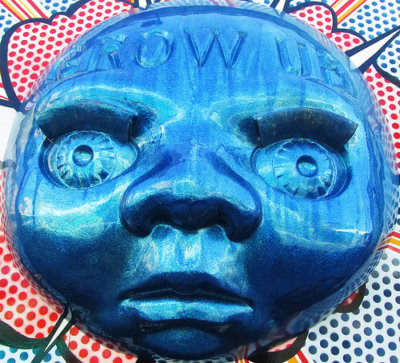What is Transactional Analysis?

By: Newtown grafitti
by Andrea M. Darcy
Interested in a form of therapy that helps you troubleshoot the ways you behave around others?
Would you like to understand why are one way around one person, and entirely different with another?
Then transactional analysis might be for you.
What is transactional analysis?
Transactional analysis, or ‘TA’, is interested in the interactions between people. Each time we encounter another person or group, we react and respond to each other.
Transactional therapy is a practical system that helps you understand why you think, feel, and act in the ways you do. It seeks to help you manage and change your social reactions so that you feel better about yourself and your life.
What school of thought does it fall under?
Useful for both individuals and groups, transactional analysis is sometimes put under the humanistic umbrella, as it is very much about helping you reach your potential.
But it did originally rise as a way to improve psychoanalysis, and its creator, Eric Berne, was influenced by Freud. So transactional analysis can also sometimes be grouped with psychodynamic therapies.
Regardless, it’s a versatile approach that can work alongside other tools and approaches, and be used both as a short-term therapy or a long-term one. So you’ll find transactional analysis most commonly used by integrative therapists.
A brief history of transactional therapy

By: Ahmad Hammoud
Transactional therapy was created by Eric Berne in the 1950s. When the San Francisco Psychoanalytic Institute refused his membership even when he had 15 years of training, it was perhaps a blow to Berne. But it became a boon for psychotherapy.
It led to Berne turning his back on psychoanalysis, and fleshing out his criticisms that it was based on theories over anything that could be seen and proven.
Berne had a very clear goal of making a science to measure human behaviour. He didn’t want to just ‘analyse’ and understand his patients or give them ‘awareness’. He wanted to cure them and give them practical tools to create real change.
Berne looked to neuroscience research going on at the time, and began to study hundreds of patients.
TA and the power of social interactions
He conclusion was that answers were not to be found by understanding our personalities, but by understanding our social interactions. He recognised the way we socialise can be seen as a measurable unit called a ‘transaction’. It becomes a pattern of action and reaction that is observable and therefore changeable.
Instead of a therapist only learning about patients by asking how they were, Berne began to realise a therapist needed to notice how the patient communicated. This included their words, gestures, facial movements, body language, and behaviours.
After several years of hard word creating his framework, in 1958 Berne’s article explaining and summarising transactional analysis was published. It received positive acceptance, with many therapists implementing his techniques.
The main concepts of transactional therapy
1. Unconscious patterns and ways of being run our lives.
We like to think we are in control of our choices, yet most of us lack true awareness of our behaviours and how they affect others. We are often not even aware of our real thoughts or feelings, but are run by our unconscious mind.
2. We all have different sides to ourselves (and we can call them ‘ego states’).
Berne agreed with Freud that we are all multifaceted. But he found Freud’s ‘id/ego/superego’ theoretical instead of practical. Berne felt our different facets were actually patterns to be found in social interactions.
He calls these parts of our personalities ‘the Ego States’, and defined them as“a consistent pattern of feeling and experience directly related to a corresponding consistent pattern of behaviour.”
He identified three ego states, which are the Parent, the Adult, and the Child (*note that these states are different in meaning than the way we usually use these words).
3. Each of our three Ego States has distinct ways of thinking and being.
The ‘Parent’ is dominant and judgemental, and always deciding what should and should not be done. Phrases from the parent state tend to start with ‘should, always, never’ or be commands.
This ego state arises from all the recordings the brain makes of the things we experience during the first five years of our lives.

By: Barney Moss
The ‘Child’ can either be our inner rebel, or it can be the overly dependent side that pleases others at the expense of meeting our own needs. It is also the state we are in when we are being passive aggressive, or sulking to get our needs met. Statements from the Child tend to involve feelings and desires.
The Child ego state arises from the emotional states we experienced in the first five years of life.
The ‘Adult’ is rational, it likes to think things through, and evaluates. It is the state we are in when we making practical choices learning something. Statements from the Adult tend to involve practical questions, decision-making, and logical, fact-based responses.
The Adult starts to develop when as a child we began to see differences between what we observed others doing and what we felt.
4. We change our Ego State depending on who we are interacting with.
Each time we interact with others, or have a ‘transaction’, we will call upon a different ego state, depending on which one we feel more comfortable with.
Often we have a pattern of transaction that we use repeatedly. For example, we might always act from the Child ego state around our partner. This sort of repeat pattern is called ‘a game‘.
5. Most of us are living out the same story, or ‘script’, again and again.
Most of us unconsciously live from the Child and from the ideas we developed when growing up.
Transactional analysis calls this our ‘life script’. Just like a movie script, it decides what role we play and if other people are good or bad. Because we are always playing out the same scenes, we make the same mistakes again and again, like a pattern on repeat.
6. By changing our ego states, we can change our ‘life script’ and create a new one.
It’s only when we recognise that we are playing different roles and living out the same story on repeat that we can begin to make different choices. We can see that there are other ego states we can start to act from that lead to feeling more in control of our lives.
How transactional analysis helps your relationships
When you understand that most of the time you are unconsciously acting out roles? You can then start to experiment with choosing other, more effective ways of being.
For example, let’s look at a typical at home situation. “Did you remember to take out the rubbish?” is asked of you. And you respond with, “Why is everything my fault around here!” The question is an Adult question, but the response is coming from the Child. What would happen if the next time this situation arose, you went for the Adult reaction? “No, but there is still time so I will do it now.”
Of course changing the way we respond to others can feel strange at first. But your transactional therapist is there to support you and help you decide what situations call for what behaviours. Together you can decide what goals and results you want from your relationships, then ‘change your script’ and reach those aims.
Ready to stop acting out a bad script and rewrite your life? Work with our highly rated London team or use our sister site to find UK-wide registered therapists ranked by client reviews.
Still have a question about ‘what is transactional analysis’? Or want to share your experience of trying this form of therapy? Use the public comment box below.
 Andrea M. Darcy is the editor and lead writer of this site. A previous screenwriter turned mental health writer, she has researched practically every modern from of psychotherapy as well as trying many herself. Find her on Twitter.
Andrea M. Darcy is the editor and lead writer of this site. A previous screenwriter turned mental health writer, she has researched practically every modern from of psychotherapy as well as trying many herself. Find her on Twitter.




